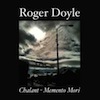 Every once in a while, a familiar artist takes me completely by surprise. One Sunday night, I was making the long drive home to Dublin from my then fiancée’s place in Northern Ireland. On the radio was the weekly contemporary music show on the national classical music station. This particular edition was dedicated to a work in progress by Roger Doyle; different segments being played with an interview with Doyle interspersed between them. I have always been fond of Doyle’s music but listening to parts of what would eventually become Chalant was a revelation. Built around old answering machine messages, Doyle weaved his own past through his music and combined bittersweet memory with an overreaching arc of life’s progress and the construction of the artist’s cannon. Throughout the next few days and weeks, the music and themes of the work resonated within my head. This was a deeply moving and thought-provoking composition and I could not wait to listen to the album properly.
Every once in a while, a familiar artist takes me completely by surprise. One Sunday night, I was making the long drive home to Dublin from my then fiancée’s place in Northern Ireland. On the radio was the weekly contemporary music show on the national classical music station. This particular edition was dedicated to a work in progress by Roger Doyle; different segments being played with an interview with Doyle interspersed between them. I have always been fond of Doyle’s music but listening to parts of what would eventually become Chalant was a revelation. Built around old answering machine messages, Doyle weaved his own past through his music and combined bittersweet memory with an overreaching arc of life’s progress and the construction of the artist’s cannon. Throughout the next few days and weeks, the music and themes of the work resonated within my head. This was a deeply moving and thought-provoking composition and I could not wait to listen to the album properly.
Just when Chalant had drifted from my mind, it suddenly came into existence again. It would be a little while before I would get to hear it completely, however. Once I got to sit down with the album, my first few listens were a combination of recollection and integration of the unheard material. It was as good as I had remembered and the concept had been fleshed out into a very robust whole. An opening volley of piano movements set the tone for the album; Doyle’s playing is poignant without being morbid or depressive. When the first voices appear, they are those of Doyle’s parents. Instead of momentous advice to Doyle, their words are the normal kind thoughts of caring parents. Doyle’s mother worries about her son’s health and his father lets him know about post that has arrived for him.
The feelings of being contacted from beyond the grave continue into the album’s middle section with a stunning vocal performance by the late Jonathan Philbin Bowman. Similar in tone to some of Philbin Bowman’s radio spots where he would offer some thoughts for the day, "Coat-hanger Kisses" was a freer, more poetic look at his world which has more in common with a Joycean stream of consciousness than his more familiar (to the public at least) journalistic style. Doyle gives Philbin Bowman a backing that he deserves, the rolling delivery of the words matched by tidal piano lines. The fact that this was hardly a planned piece (Philbin Bowman passed away in 2000) but it works like the two of them had sat down and written it together.
Despite the album’s subtitle of Memento Mori, there is more to Chalant than death, even if mortality stalks the various melodies throughout the album. Doyle explores the concept of family and the process of passing the torch from generation to generation with his focus on his own son’s life. Paavo Evans-Doyle appears at several points, starting with his endearing messages on "Back in Time" where, as a young boy, he tries to leave more and more inventive messages on his father’s answering machine. Placed in between the messages of Doyle’s parents and Philbin Bowman, Paavo represents another loss but this time it is a loss of innocence and the knowledge that this charming little boy will fly the nest at some point. The arrival of another generation is heralded on "Birth" though this time the answering machine has been replaced with text messages being read by the computer; the indifferent sterility of the computer at odds with the fecund event of a new human life.
The final thread running through Chalant is the subject of all these messages: Doyle himself. Through the lens of these recordings and these pieces, Doyle revisits important milestones in his career from early correspondence with the Groupe de Musique Expérimentale de Bourges (related here by his father) to his live soundtrack for a stage version of Oscar Wilde’s Salomé at Dublin’s legendary theater, The Gate. Throughout "Salomé at The Gate," he weaves a narrative around the event from being accepted for the show to its teething problems, favorable reviews and backstage politics, all brought together by Doyle to give a flavour of the excitement of the time.
Doyle’s self-reflection is not restricted to his professional development as he studies his own mortality through similar methods. "Back from Hospital" features many of his friends and family asking about a recent illness and the process of aging is examined on the aforementioned "Birth" as Doyle becomes a grandfather. Chalant’s final piece, "Departure," actually immediately follows "Birth." It is an open-ended piece, though at a slower pace to much of the rest of the album. It hints at an eternity in its various permutations but the inescapable finality of silence as the CD stops is as metaphorical as it is unavoidable.
samples:
 
Read More


